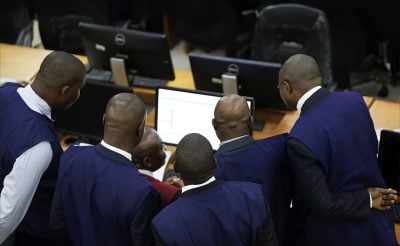Africa’s leading Artificial Intelligence (AI) I practitioners, students, policymakers, and enthusiasts are convening from September 4th-9th in Accra, Ghana, for Deep Learning Indaba (DLI), Africa’s premier AI event.
Reflecting the importance of Africa’s talent and ideas to the global AI ecosystem, DLI is sponsored by leading AI companies including InstaDeep, OpenAI, Google DeepMind, and Nvidia. Alongside other upcoming events including the UN General Assembly, the Africa-US Presidential Forum on STEM/AI, and the UK Global AI Safety Summit, DLI presents an opportunity for African leaders to highlight the achievements of the continent’s AI ecosystem while mobilising the technical and financial resources necessary to materialise its full potential.
The African AI ecosystem may be small, but it is growing fast. Advances in the past few years have accelerated infrastructure and policy development, while a vibrant community of talent builds exciting new applications. Entrepreneurs, academics, and policymakers understand the opportunity and are intent on exploring ways to harness its potential.
However, challenges abound.
African countries are not a monolith, but largely they face persistent infrastructure constraints from power grid deficits, limited internet connectivity and divide, and an immature IT ecosystem. This, coupled with challenges specific to AI adoption such as the prohibitive cost of internet access and computing hardware, data scarcity and the low availability of advanced technical skills, threaten to thwart the development of the ecosystem before it takes off.
According to the United Nations Economic Commission for Africa (UNECA, the opportunity is huge: Africa has the potential to build a $1.5 trillion AI economy. Strategic states that properly harness era-defining technologies such as AI can fundamentally transform how they deliver better services for more people at lower cost. The global spotlight on AI gives African leaders the chance to mobilise the resources needed to make this a reality.
Three ways to accelerate African AI
In convenings of leaders, such as DLI, African leaders should prioritise three tractable activities to accelerate the continent’s ecosystem: 1. forging partnerships for talent development; 2. enabling greater access to compute resources; and 3. launching impactful AI pilot projects. Here’s how.
Advancing the talent ecosystem
Advanced engineering talent is one of the most crucial factors in an AI ecosystem, and Africa is taking important steps to nurture home-grown talent. African universities now offer degrees or specialisations in AI. AI-focused training programs and bootcamps are also re-and upskilling workers. Technology companies such as IBM, Google, and Microsoft are increasingly looking to Africa for AI and other emerging technologies, as well as opening research labs across the continent.
But these activities are not enough. According to Coursera’s latest Global Skills Report, African countries rank lowest on proficiency in technology and data science skills.
With the world’s youngest population, African leaders should develop streamlined partnerships for inclusive skills development. These could follow the lead of, for example, the US-India AI Initiative which has given Indians access to AI-related workshops, roundtables, resources, and funding to support collaboration between India and the US on AI. Inspired by this, these partnerships could include corporate knowledge transfer programs, scholarships, public sector workshops, and broader AI-literacy training.
Access to AI-era infrastructure, now
There have been many recent noteworthy developments in Africa’s cloud, computing, and data infrastructure landscape. The launches of Toubkal, Africa’s most powerful supercomputer, and the African Supercomputing Centre are particularly exciting. Cloud penetration continues to grow across the continent, with the public cloud forecasted to grow 17-20% compounded year-on-year.
On data, several initiatives aim to digitise public services and promote open data principles. However, access to computers remains prohibitive for many researchers and entrepreneurs, and quality data can be scarce. While building African computer infrastructure for the medium to long term is critical, so is the distribution and use of computers in the short term. By not having adequate access to computing resources now, African leaders risk stifling innovation and product offerings as well as talent drain. African leaders should facilitate public-private partnerships to unlock greater computer access today. These partnerships should focus on using computers to build strategic competitiveness on locally relevant AI applications.
The recent partnership between Nvidia, UNECA, Global Partnership for Sustainable Development Data, and Future Tech to provide data science training and compute resources to the national statistical offices of 10 African countries is a step in the right direction. However, it does not cover enough ground. Greater partnerships with cloud and computer providers can unlock computer access and training across the public sector and for universities, bootcamps, and tech hubs.
Leading AI pilot projects
Leadership in Malawi, Ghana, Rwanda, and Sierra Leone have recently expressed openness and enthusiasm for the responsible adoption of AI in Africa. AI-use cases across the continent are growing, most often facilitated through government leadership. These applications are not just beneficial for economic and technological growth, but for the delivery of public services and acceleration of development.
Impactful products such as Zipline, the AI-powered drone medical delivery service used in Ghana and Rwanda, and Novissi, Togo’s AI-based cash transfer tool should inspire African leaders to continue to champion greater responsible adoption. The Singapore government’s recent partnership with Google Cloud to provide two sandboxes for government agencies and businesses to develop and test generative AI applications is one model that should be explored.
At the Tony Blair Institute for Global Change, we have leaned into this framework and developed a toolkit to support African governments in identifying potential use cases as well as partners to engage.
Surmounting challenges
AI is in no way the panacea to Africa’s problems. However, it presents a promising opportunity to address some of its challenges, accelerate development, and realise its potential as a global tech player. Enthusiasm from leaders is there, with efforts underway to develop an Africa AI strategy at the African Union. While building a comprehensive continent-wide AI plan, African leaders can leverage the global spotlight on AI, including this week’s highly anticipated convening of leading AI companies and practitioners at Deep Learning Indaba to take these three steps, and fast-track the development of the continent’s AI ecosystem.
Want to continue reading? Subscribe today.
You've read all your free articles for this month! Subscribe now to enjoy full access to our content.
Digital Monthly
£8.00 / month
Receive full unlimited access to our articles, opinions, podcasts and more.
Digital Yearly
£70.00 / year
Our best value offer - save £26 and gain access to all of our digital content for an entire year!

 Sign in with Google
Sign in with Google 



